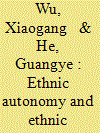|
|
|
Sort Order |
|
|
|
Items / Page
|
|
|
|
|
|
|
| Srl | Item |
| 1 |
ID:
149313


|
|
|
|
|
| Summary/Abstract |
This article investigates the temporal trend in the socioeconomic differentials between ethnic minorities and the Han majority in China. Data from a series of population censuses and a mini-census show that, while the regional distribution of ethnic minorities remained relatively stable from 1982 to 2005, occupational segregation and educational disparities between minorities and the Han increased over time. Multivariate analysis of data from the 2005 mini-census further reveals that ethnic minorities were disadvantaged in earnings in urban labor markets compared to the Han, especially those minorities in the private sector and in self-employment. The analysis also uncovers substantial heterogeneity among ethnic minorities in their socioeconomic relationship with the Han and presents a comprehensive picture of how various ethnic minorities have fared in the course of China’s economic transition.
|
|
|
|
|
|
|
|
|
|
|
|
|
|
|
|
| 2 |
ID:
159545


|
|
|
|
|
| Summary/Abstract |
To balance ethnocultural diversity with national integration, the Chinese government started formulating a series of ethnic policies in the early 1950s, including policies on identifying and classifying ethnic groups, a system of regional ethnic autonomy, and a set of preferential treatment policies toward 55 minorities. This article aims to examine socioeconomic disparities between ethnic minorities and the Han majority in China, focusing on the role played by regional ethnic autonomy. Based on a large sample of China's mini-census data collected in 2005, we show that among nonfarm working populations, minorities are more likely than the Han to become managers/professionals or obtain high-status occupation, regardless of whether they are living in their own autonomous jurisdiction or other places. Minorities are paid lower wages, however, even after controlling for other characteristics, and the gap is even wider in autonomous jurisdictions than elsewhere. Finally, children of mixed Han-minority marriages in ethnic autonomous jurisdictions are more likely to identify themselves as minorities, especially those holding urban registration status (hukou) whose parents have received more schooling. Our findings bear important implications for the current debate on ethnic policy in China.
|
|
|
|
|
|
|
|
|
|
|
|
|
|
|
|
| 3 |
ID:
173260


|
|
|
|
|
| Summary/Abstract |
Much scholarly attention has been devoted to the subject of whether and how social connections affect political trust. China provides a critical case because of the unique guanxi networks and the symbiosis between the state and non-governmental associations. In the Chinese context, this analysis proposes that: 1) informal social ties impair political trust since guanxi networking offers provisional publics the transmission of political stimuli, 2) formal social ties foster political trust because associations and the state coexist in a state-dominant symbiotic sphere that brings about political trust assimilations by helping associations realize their agendas and interests. Based on survey data from urban China, findings from both standard models and auxiliary instrumental variable analyses generally support these predictions.
|
|
|
|
|
|
|
|
|
|
|
|
|
|
|
|
|
|
|
|
|